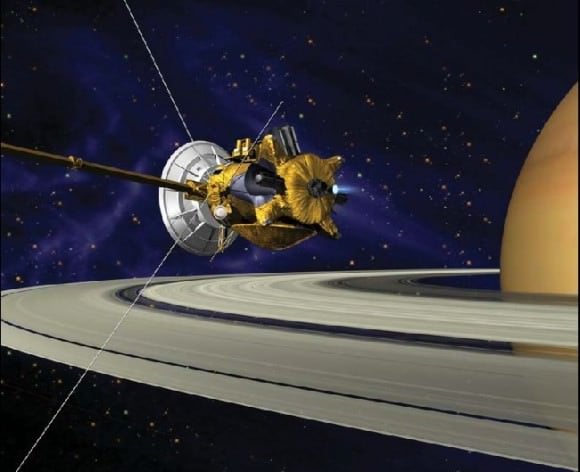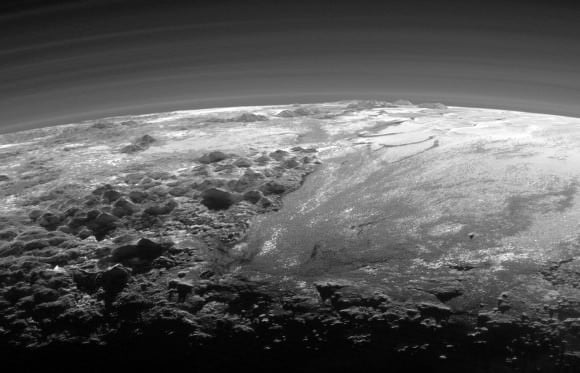If you've seen at least one other episode of the Guide to Space, you know I'm obsessed about the Fermi Paradox. This idea that the Universe is big and old, and should be teeming with life. And yet, we have no evidence that it exists out there. We wonder, where are all the aliens?
Ah well, maybe we're in a cosmic zoo, or maybe the Universe is just too big, or the laws of physics prevent any kind of meaningful travel or communications. Fine. I doubt it, but fine.
As we've demonstrated here in our own corner of the galaxy, it's not our weak fleshy bodies that will be doing the hard work of exploring the Solar System, and eventually the galaxy, it'll be the robots.
So a better question might be, where are all the robots? At the time that I'm writing this video, we're in October of 2016. If you're watching this on a video device years in the future, the robot uprising and apocalypse hasn't happened yet.
The most sophisticated walking robots can barely lurch around and they're laughably slow, 3D fabrication is an inefficient process, and our artificial intelligence devices are pretty dumb, barely able to understand when I ask for directions.
But even so, our robots have helped us explore the Solar System, and helped us see things with cameras that our fleshy meat eyeballs may never experience. Robots from Earth have orbited asteroids, visited comets, observed Mars from orbit and the ground, and even flown past Pluto.
In the coming decades, many new robotic missions will continue this era of exploration, maybe floating in the cloud tops of Venus, sailing the hydrocarbon seas of Titan, flying in the skies of Mars, or exploring the vast oceans under the ice of Europa.
It makes sense then, for us to eventually get around to sending a robotic spacecraft to another star. Based on our current technology, it'll be incredibly complicated and expensive, but there's nothing in the laws of physics that prevents it.
And if we're going to send a robot to another star system, we might as well make it a factory, capable of creating another version of itself. Find an asteroid with all the raw materials to make more robot factories, and send them off to other stars, where they can make more copies, and so on, and so on.
What I'm describing is the concept of a von Neumann probe, named after the mathematician John von Neumann. He was investigating the implications of self-replicating robots in the 1940s, and imagined non-biological "Universal Assembler", devices that could make copies of themselves.
Von Neumann didn't apply the idea to spacecraft, but others like George "Spheres" Dyson understood that out in space, there was a nearly limitless amount of raw materials for spacecraft to build copies of themselves.
Even though the Milky Way measures 120,000 light-years across and contains 100 to 400 billion stars, self-replicating robot factories traveling at just 10% the speed of light could colonize the entire galaxy in about 10 million years. That's the power of exponential exploration.
Think about it. All it takes is for a single clever alien engineer to craft a single robotic factory. That factory builds copies of itself which fly off to other stars. Once they get there, they build more copies of themselves, and so on and so on.
Seriously, in the 13.8 billion years that the Universe has been around, why didn't a single alien engineer do this?
The cosmologist Frank Tipler concluded that this was such an obvious thing to do that he wrote a paper in the 1980s called "Extraterrestrial intelligent beings do not exist." Carl Sagan found the argument troubling, proposed that aliens would be concerned with environmental collapse and would restrict the use of this kind of technology.
Why haven't we received signals from extraterrestrials yet? Maybe because it's inefficient. It's much more efficient to send physical probes to communicate with other civilizations.
Remember 2001? I know it was a pretty complicated movie, but that was the point. The aliens let us know we're not alone by sending their robotic spacecraft to our Solar System. That's what those monoliths were for. Well, sort of. They were a message, they were a kind of encyclopedia, an evolutionary accelerator and doomsday device, all rolled up in one.
Still think it's important to take your fleshy meat body to experience other worlds personally? No problem. Modify your von Neumann probes to be terraforming probes. Instead of merely building factories, they travel to other star systems, identify the planets that could be made habitable for humans, and then get to work.
We've written many articles about what could be done to terraform worlds here in the Solar System, and that work would mostly be done with robots anyway. Some robots could redirect asteroids and comets to supply raw materials, robotic shades to cool planets down, ground-based factories could change the atmosphere to something breathable.
You could even imagine robotic nurseries, carrying seeds and genetic material for plants and animals. They could get these planets livable, so that when our descendants arrive, the world is ready to go and fully habitable.
There's a darker idea too, the concept of Berserker Probes. These were first put forth by the science fiction author Fred Saberhagen. Imagine aliens send an initial scouting robotic spacecraft to a star system to search for life, and any possible competition to the colonization of the galaxy.
If a potential competitor is found, the robotic spacecraft redirect a bunch of asteroids at the habitable planet to scour it free of life.
Then the terraforming robots move in and make the place livable for the aliens. And then the aliens move in, blissfully unaware of who used to live on the planet.
Maybe other aliens anticipating this threat, create their own police von Neumann probes, designed to seek out Berserkers and defend against them.
If you play video games, the best telling of this story is through the Mass Effect series, and their Reapers. Edge of Tomorrow was about defending Earth from terraforming robots.
Although I find the Fermi Paradox puzzling, I get that it's probably hard for aliens to travel and communicate across the vast distances of space. But shouldn't we at least see their robots?
Actually, based on what I just said, I'm think I'm okay if we never meet their robots.
Want to learn more about von Neumann probes? PBS Space Time just did
 Universe Today
Universe Today





